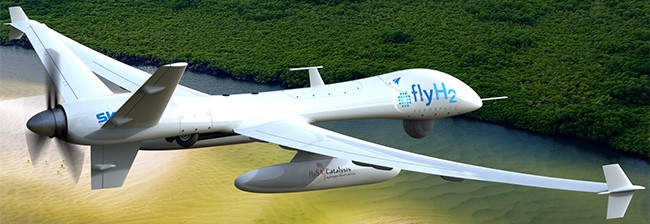
Cape Town-based private pilot and entrepreneur, Mark van Wyk, has won first prize at the first Avi Awards for his prototype unmanned aerial vehicle (UAV) that will become the first hydrogen-powered aircraft, fully developed in SA.
The awards, introduced on Wednesday night at the Avi Afrique Innovation Summit at the Council for Scientific and Industrial Research in Pretoria, are a culmination of the partnership between the Technology Innovation Agency (TIA) and the Air Traffic and Navigation Services (ATNS).
Van Wyk, founder of the company FlyH2 Aerospace, and his partner, Onno Huyser, are developing a large, fixed-wing unmanned aircraft for survey and environmental research purposes. The aircraft will be powered by novel miniaturised hydrogen fuel cells designed, prototyped and trialled by TIA Seed Fund recipients at the University of Cape Town, HySA Catalysis.
FlyH2 Aerospace is a licensee for the patented fuel cell technology. The hydrogen fuel cells would provide an electric propulsion alternative which is carbon-neutral, has zero-emission and is environmentally-friendly.
"The system is completely toxicant-free. In the future, our company wishes to further develop the technology to a level where it can also power manned aircraft. Both Boeing and Airbus have done significant research into hydrogen fuel cells. This could be the future of green aviation," says Van Wyk.
"When our prototype UAV is complete, it will become the first hydrogen-powered aircraft, fully developed in South Africa - something our nation can be proud of."
The hydrogen fuel cells will enable the UAV to survey larger areas for environmental research at lower energy cost and environmental risk, says Van Wyk.
Among other uses, he adds, South African researchers will potentially be enabled to gather comprehensive and important earth observation data with the intention of improving land-use, planning and environmental management which, in turn, will add to improved sustainability management.
"Surveying large areas for environmental research is expensive using traditional manned aircraft methods," Van Wyk points out.
"Hydrogen fuel cells will enable our UAV to perform these missions, over large areas, at a lowered cost, and lowered risk."
Van Wyk walked away with a monetary prize valued at R20 000, accompanied by a trophy and a certificate.
"I was honoured to win the first prize for the event. I received a flurry of well wishes and support from TIA, ATNS, and South African National Space Agency, encouraging me to continue developments of the hydrogen-powered unmanned aircraft we're co-developing with HySA Catalysis.
"Our dedication, passion and commitment to the aviation industry and preserving the environment was well-received by the judges. A special thanks to all involved in putting together this prestigious event," Van Wyk concludes.